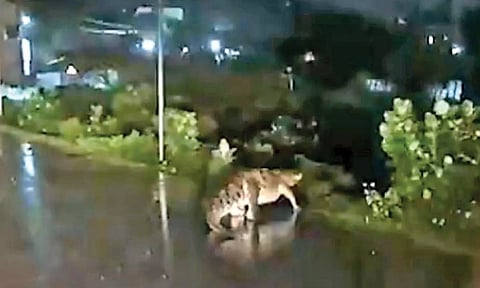

CHENNAI: Over the past three years, the southern suburbs of Chennai had reported at least half-a-dozen stray cases of adult and young crocodiles entering roads and residential areas between Chengalpattu and Tambaram areas. Particularly, it was open season for crocodiles during the 2019 and 2023 floods.
“Crocodiles are not only making headlines, but the fact is that there is a serious threat to their habitat destruction, due to unchecked industrial and port activities along the TN coast and rivers,” admitted a State forest official insisting the need for a maiden scientific study on the state of crocodiles in TN.
“Tamil Nadu and Orissa have something in common — crocodiles. Both states, which had started the crocodile rehabilitation programmes for the Mugger and Saltwater crocodiles some 30 years back, are now blessed with such wild reptiles in abundance. This furthers the need for studies and examinations so that there is no future stray of crocodiles resulting in man-animal conflicts,” observed conservation scientist A Kumaraguru, Biodiversity Conservation Foundation, Tiruchy.
While crocodile attacks resulting in human deaths are a serious issue in Orissa, the situation in Tamil Nadu is far better. “While Orissa succeeded in breeding wild saltwater crocodiles, TN, with the aid of Madras Crocodile Bank and State-owned crocodile farms, succeeded in breeding captive muggers,” Kumaraguru explained.
However, in the case of wild crocodiles, TN is slipping. The crocodile sighting in Vaigai river in Madurai, Cauvery river near Erode and Tirupur had reduced due to pollution, and depletion of prey (fish) because of invasive fish like tank cleaner. But in the case of the Delta region, the sighting of crocodile and human-crocodile conflict is higher. Particularly, Chidambaram, Tiruchy, Thanjavur and Kollidam in Cuddalore have high density of crocodiles per sq km, but there is no data on this, said another department official.
“Tamil Nadu, with a rich coastline, has the potential to habitat saltwater crocodiles and Otters. While the former has faced local extinction in South India comprising Tamil Nadu, Kerala and Andhra, the species can be reintroduced based on the success of Crocodile rehabilitation programmes in Orissa,” observed conservationist NVK Ashraf, senior advisor, Wildlife Trust of India, who is now monitoring the pelicans affected by recent Ennore oil spill. “In the case of mugger or marshland crocodiles, there are more than enough captive-bred reptiles. In fact, India can be an international donor for both the mugger and saltwater crocodiles under the various animal exchange programmes.”
The need of the hour is now to check the areas where these crocodiles could have lived earlier and, in those areas, they can be re-introduced. And in areas where its density of population is higher both in captive and wild, they should be re-distributed.
“Both TN and Kerala with mangrove cover can house saltwater crocodiles, but they need fish and would thrive only in unpolluted coastal waters, making survival a challenge,” Ashraf pointed out. “In the case of TN, they have succeeded in breeding mugger crocodiles, but the coastlines and estuaries are deprived of saltwater crocodiles. There are Tamil literature references of saltwater crocodiles in the Sangam era that are now extinct.”
The senior conservationist added that Ennore creek, if not polluted, could be a home to otters due to the presence of fish and mangroves. “The local aged fishermen should be enquired on this for further baseline data,” he added.